Vitaliy Melnyk is a Ukrainian entrepreneur, owner of the transport and production company TAD, and a graduate of the Key Executive MBA at UCU Business School. His business specializes in the logistics of heavy oversized cargo and the manufacturing of special equipment. And the company itself is a leader in its niche within Ukraine.
We talked to Vitaliy about his journey from his first entrepreneurial attempts at school to a large-scale business that successfully operates both in Ukraine and beyond its borders. Last year Vitaliy won the The Leadership through Resilience nomination at the UCU Business School Alumni Awards, so we decided to tell you about his experience in running a family business in Ukraine.
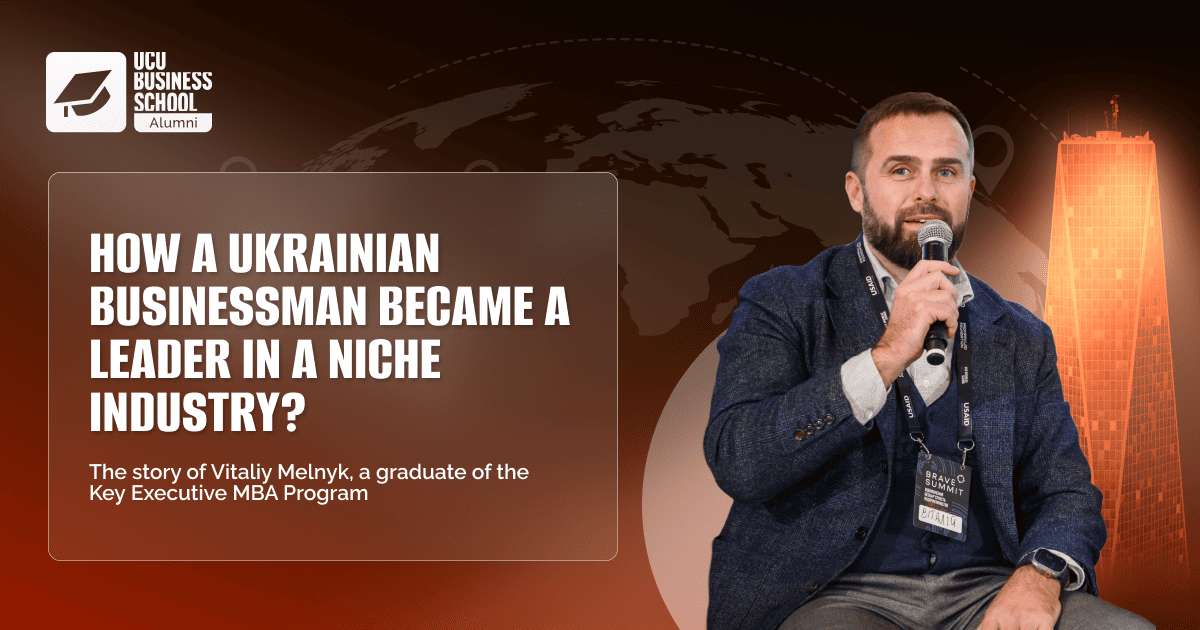 Vitaliy, tell us about your business? What do you produce and how did it all start?
Vitaliy, tell us about your business? What do you produce and how did it all start?
Today TAD has two main lines of activity: the logistics of heavy oversized cargo (everything that is tall, long, wide and heavy) and the manufacturing of special equipment. We produce wagons and trailers for the transportation of these oversized cargoes. Around 600 people work in the company.
My story is quite typical for many Ukrainian entrepreneurs. I grew up in the 90s, and I wanted to have fancy jeans and nice sneakers. Now it seems like a trivial thing, but back then it was a real dream. My parents were not able to provide that for me, so from childhood I had a strong incentive to earn my own money. I took on various part-time jobs: I bought things, I sold things – that’s how my journey started. There were various attempts – some successful, some not so much. I also worked in various fields: construction, trade, and services.
Around the age of 30, I realized that it was time to choose something more meaningful. I had already accumulated start-up capital, so I could think more broadly. I reassessed my priorities and focused on something I liked the most and where I felt strongest. These were the areas I decided to pursue seriously.
Now I am 45 years old and for more than 15 years I have been purposefully developing the TAD brand. This business has reached top positions in Ukraine, and now our goal is to enter the international market.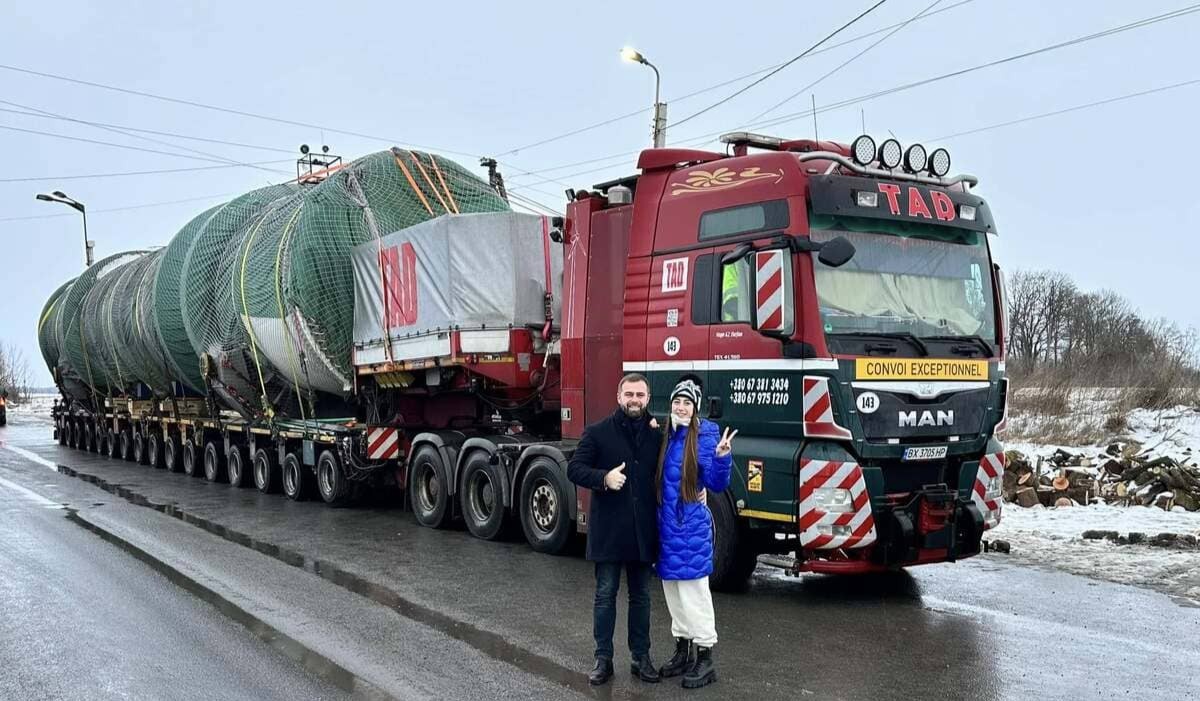 How has your company been evolving over these 15 years?
How has your company been evolving over these 15 years?
At first the company was evolving in a natural way, along with my interests. As I have already mentioned, at first the main goal was to earn start-up capital.
In the early stages, I took on any opportunity that brought in money, regardless of whether I liked it or not. But over time I understood that there are businesses that are profitable but not fulfilling. At first, I couldn’t understand why it caused discomfort, but then I realized that if you do something only for the sake of money, without feeling genuine engagement, without passion for the product, it will be much harder to become successful in that field.
 So, I began to approach my businesses selectively, focusing on areas that not only delivered financial results, but also brought me a real satisfaction from my work. This was a key transformation for me. As Henry Ford said: “My life, my work, my hobby”. I’m glad I realized it in time, because this approach became the driving force behind my further development.
So, I began to approach my businesses selectively, focusing on areas that not only delivered financial results, but also brought me a real satisfaction from my work. This was a key transformation for me. As Henry Ford said: “My life, my work, my hobby”. I’m glad I realized it in time, because this approach became the driving force behind my further development.
At what point did you realize that you needed a business education?
I had this feeling after I had already gained some experience, both positive and negative. I started to understand many things better, but I still lacked confidence: Was I doing the right thing? Was it really effective?
My classmate and childhood friend Vasyl Miroshnychenko, who is now the ambassador of Ukraine to Australia, actively supported UCU. He encouraged me to take interest in my studies, saying that I had already reached that stage. I started looking for information and talking to several acquaintances who had already studied here.
But the most important thing was my inner feeling that it was time for change, for new impetus, for structuring all the practical knowledge I already had. This is what pushed me to enter UCU Business School, and I have never regretted it. I would recommend young entrepreneurs with 5-6 years of active experience to apply for the program. Key Executive MBA program is deep and comprehensive, offering the opportunity to learn from the experience of others. A strong community built on connections is important. If I had started earlier, I would have spent less time on some projects and would have achieved greater results today.
I would recommend young entrepreneurs with 5-6 years of active experience to apply for the program. Key Executive MBA program is deep and comprehensive, offering the opportunity to learn from the experience of others. A strong community built on connections is important. If I had started earlier, I would have spent less time on some projects and would have achieved greater results today.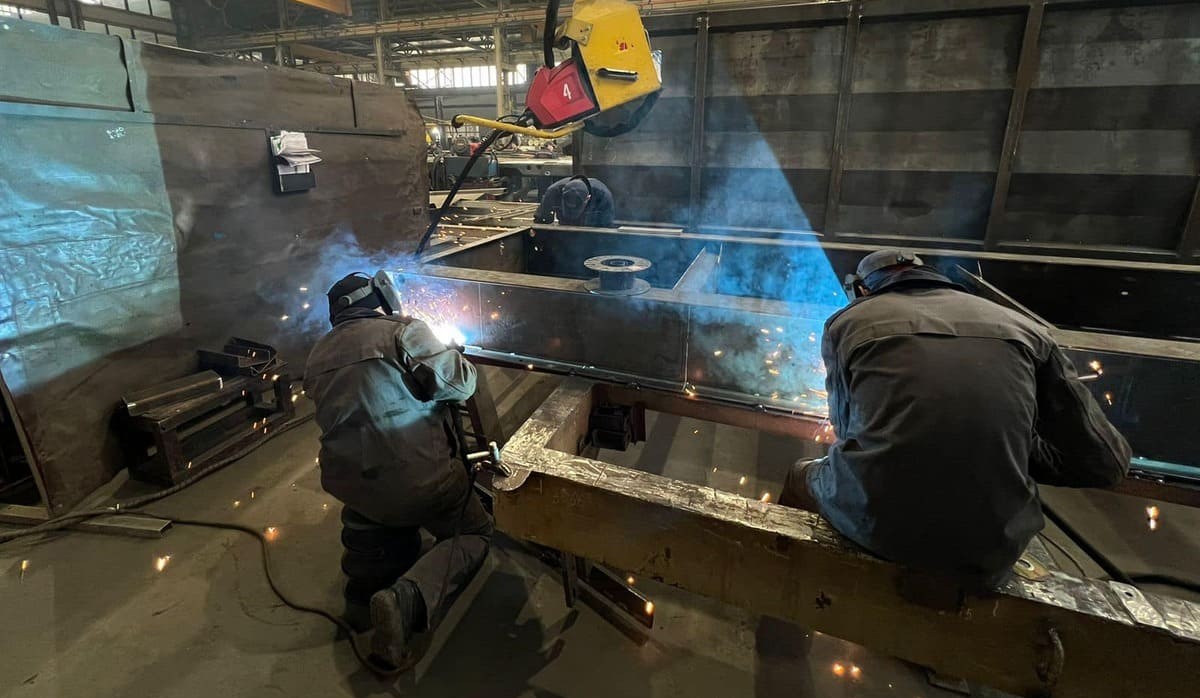 Learn more about the master’s programs of UCU Business School.
Learn more about the master’s programs of UCU Business School.
How has the war affected your business? What challenges have you faced, and were you able to find new opportunities in these circumstances? I also know that your company is actively helping the Ukrainian Armed Forces. Could you tell us about your support for the country’s defense?
The war has undoubtedly become the biggest challenge, not just for me, but for most Ukrainians. It has brought uncertainty, a lack of understanding about the future, and many unanswered questions: How will the situation on the frontline evolve? What will peace look like, and what guarantees will it bring? One cannot prepare for such a situation in advance – there is hardly any business school or institution that can teach you how to navigate wartime.
If we are talking about business, we could probably have grown much more and scaled up faster without war. But reality has made its own adjustments. Fortunately, our company is located in western Ukraine, so we haven’t faced the same risks as businesses in Kharkiv or frontline regions. Despite everything, our business has survived and continues to grow. During the war we grew by more than 40%. We have adapted our processes, shifted some directions and saw that our model was resilient enough to cope with the challenges.
As for supporting defense capabilities, traditionally, as most Ukrainians, we volunteer, and of course, we are involved in other projects. I will share more once the war is over.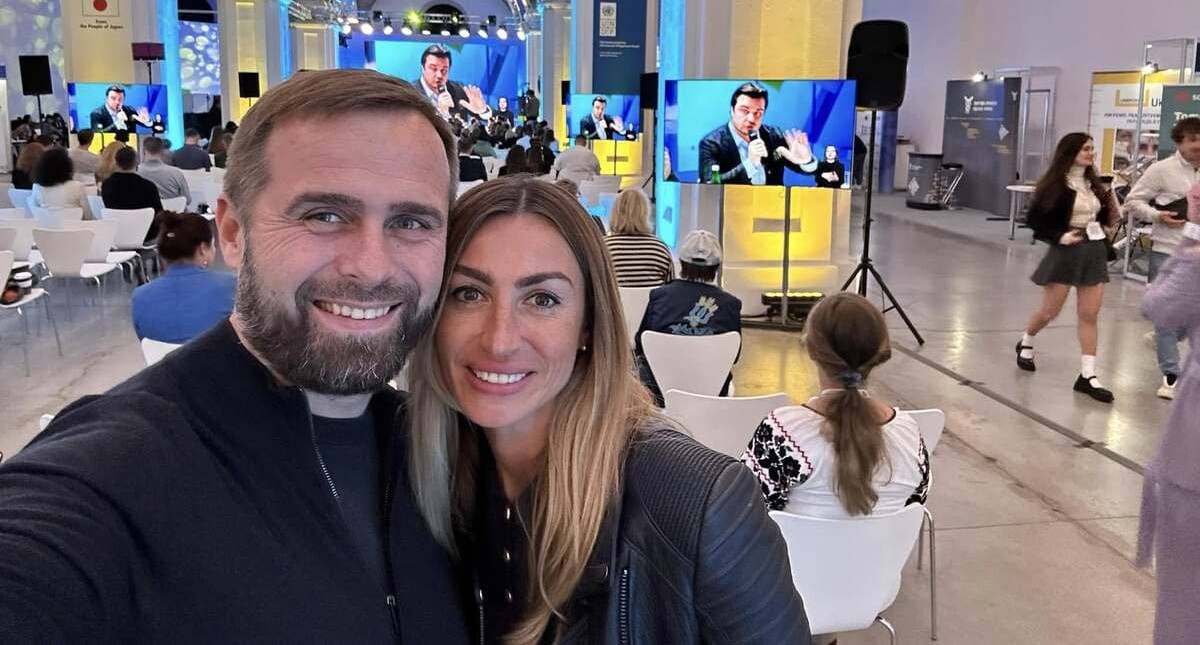 Does your company export? How has the war impacted your access to international markets? Has it become easier or more difficult for Ukrainian businesses to compete abroad?
Does your company export? How has the war impacted your access to international markets? Has it become easier or more difficult for Ukrainian businesses to compete abroad?
Yes, our company operates both in Ukraine and Europe. If we talk about our service business, particularly logistics, the international share has grown significantly. The war has affected the market in such a way that some European companies left Ukraine allowing us to take their niche. This has contributed to our development in addition to the constant organic growth of this business line in our company.
However, the product-based segment related to manufacturing has its own particularities. Our products have a long-life cycle, are made to order and are not stock items. Therefore, entering the international market in this segment is more complex and time-consuming. The world is pragmatic – no one is waiting for us there. Although many countries support Ukraine, business remains business and everyone protects their market, economy and employees. Ukrainian business has to fight hard for its place abroad, and I cannot say that it has become easier.  We are actively looking for foreign partners and regularly attend and participate as exhibitors in international trade shows. Last year we showcased at major exhibitions in Rotterdam and Hannover, this year we plan to participate in the largest special equipment exhibition in Munich. We are also in negotiations for participation in other similar events.
We are actively looking for foreign partners and regularly attend and participate as exhibitors in international trade shows. Last year we showcased at major exhibitions in Rotterdam and Hannover, this year we plan to participate in the largest special equipment exhibition in Munich. We are also in negotiations for participation in other similar events.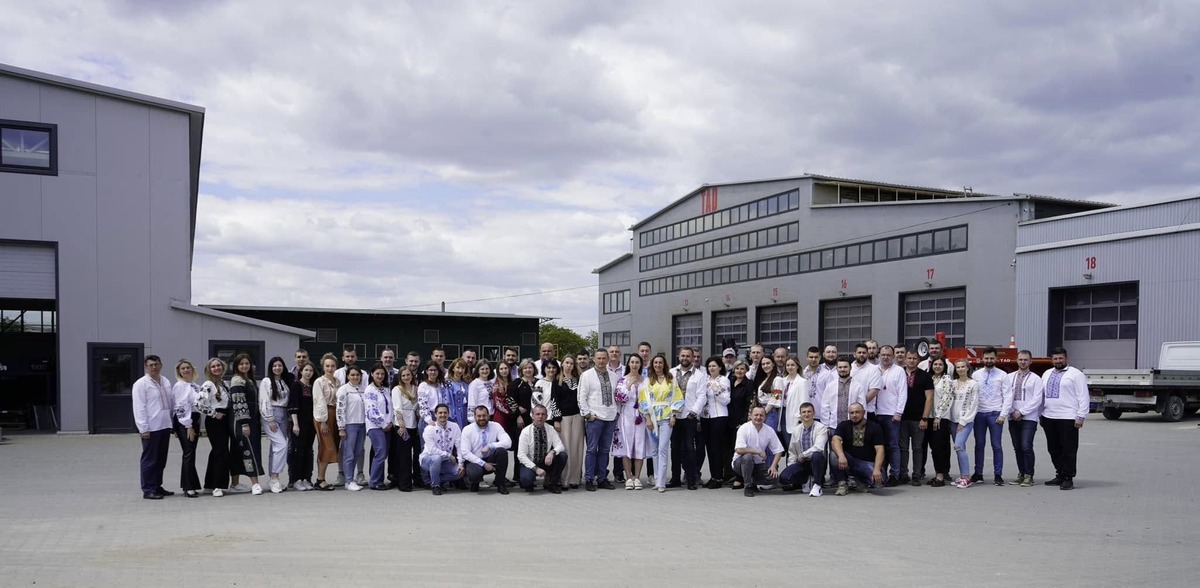 What strategies do you use to attract foreign partners and investments?
What strategies do you use to attract foreign partners and investments?
Our company operates under a classic financing model – we use bank loans. Our credit history allows us to secure the necessary funds in sufficient amounts for now, but we are also considering various options in case of a rapid business scaling. Moreover, I believe that right now is one of the most favorable times for business in Ukraine in terms of access to financing, with interest rates ranging from 3.5% to 4%, which is the cost of money in developed economies. The banking system offers favorable conditions, and there are numerous government grant programs available.
Now is truly a great time for young entrepreneurs to start their own business. There was a time when such conditions were just a dream.
And today, what does the UCU Business School community mean to you? Do you stay in touch with your groupmates, and do you maintain any connections in general?
We keep in touch regularly and have business connections. For example, we recently signed contracts with Roman Kazanko (a graduate of the UCU Business School’s Post-MBA mentoring program and owner of the Brovary Boiler Equipment Plant Ardenz) to manufacture 50 trailers for his company. He will use them to mount his boiler equipment and sell further.
UCU is a special institution for me, because it is based not only on knowledge, but also values. It is a place where you can be confident that the people, who come here, have the right perspectives and can be trusted. This year your wife also entered the Key Executive MBA program at UCU Business School. Did you inspire her to apply? And speaking of family business development, what advantages does your family see in this?
This year your wife also entered the Key Executive MBA program at UCU Business School. Did you inspire her to apply? And speaking of family business development, what advantages does your family see in this?
This is, first and foremost, her own decision; she has already reached this level. Of course, we discussed it and given my positive experience of studying at UCU Business School, I recommended this particular institution to her. The shared experience of studying will help my wife and me to better understand each other in business.
Our daughter works in the company, she is 21 years old. I hope she will continue our business and make it even better. I dedicate myself fully to the company – my energy, emotions and talents – and this gives a powerful boost to its development. In a family business this energy is passed from the owners to the team, motivating them to move forward. Ukraine may not have global corporations that build their strength on scale or monopoly, but our advantage lies in hard work, creativity and ability to create quality solutions. It is in a family business that these qualities are best revealed, and this is our strength. Learn more about the master’s programs of UCU Business School.
Learn more about the master’s programs of UCU Business School.
What are your goals for the coming years?
Our main goal is to develop our company.
Over the three years of the war, we have invested approximately 15 million euros into our business. This year, we plan to invest an additional 7 million euros. We are focusing on developing our production and logistics sectors, as well as working on our international expansion: exports and establishing production facilities abroad.
For example, I am currently working on scaling our business and business model to the US market and establishing production and logistics facilities there. This will create new development opportunities in the world’s largest market, diversity risks and open up new possibilities for exporting our products and solutions.
What qualities do you believe a true leader should have today to succeed in business?
When I started my business, there was no Internet, and it was difficult to find information. Today, there is so much that it is easy to get lost among ideas and startups. Therefore, the most important thing for a leader is to see a clear vision and direction for the company and team.
The second is people. Finding, organizing, training and motivating the right people is the key to success. And the third is to build a sustainable business model which will outlive the owner and will not disappear with them. These principles have probably evolved over time, just as the world has, and we’ll see what tomorrow brings.
I’d like to conclude with the words of Commander Valeriy Zaluzhnyy: ‘It may still be very difficult for us, but we will never be ashamed.’ Glory to Ukraine!
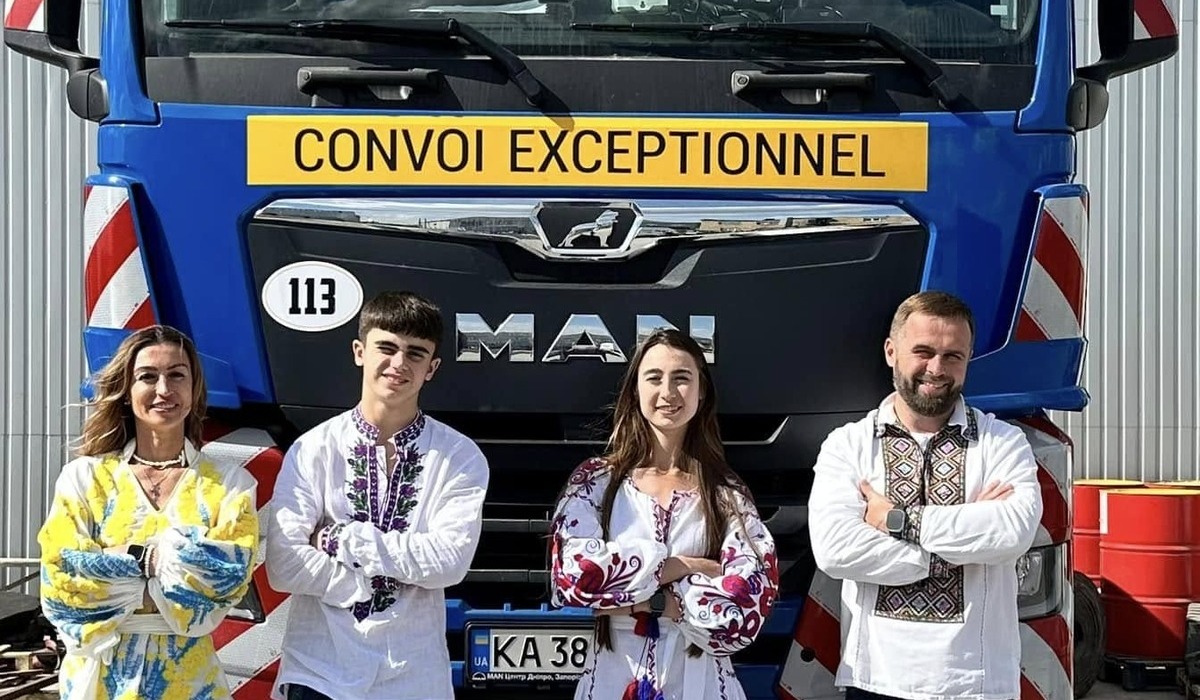
TAD is one of the leading manufacturers of special trailers in Ukraine and Eastern Europe, which specializes in the production of high-tech equipment for the transportation of heavy and non-standard cargo. The company produces trailers with a payload capacity of up to 250 tons and a configuration of 2 to 25 axles that meets international quality and reliability standards.
Over 15 years, the company has manufactured more than 2000 units of special trailers. In 2024 – 265 units. Additional facilities are currently being launched, which will increase the design production capacity to more than 500 units of medium-complexity products per year. Last year, the group’s annual turnover totaled UAH 1.4 billion and we plan to increase it to UAH 1.7 billion in 2025.




















